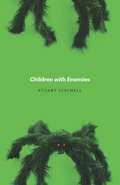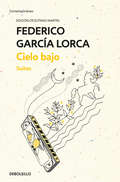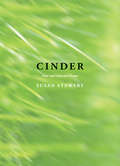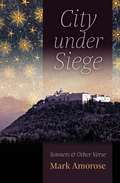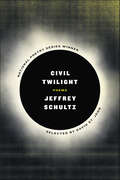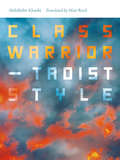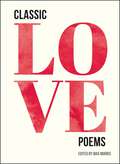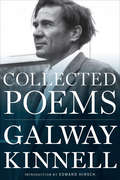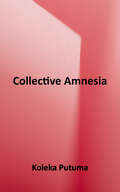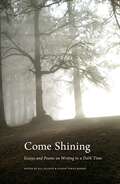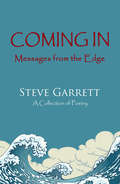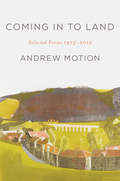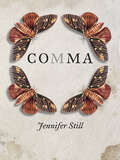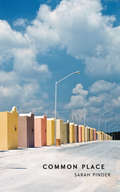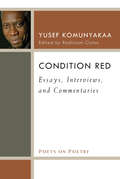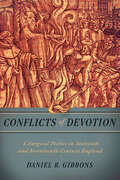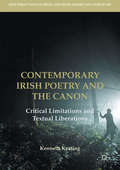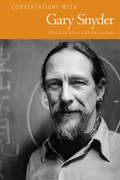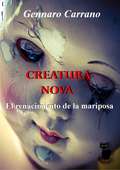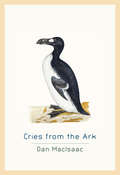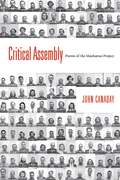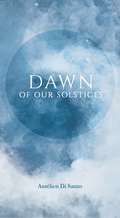- Table View
- List View
Children with Enemies
by Stuart DischellThere is a gentleness in the midst of savagery in Stuart Dischell’s fifth full-length collection of poetry. These poems are ever aware of the momentary grace of the present and the fleeting histories that precede the instants of time. Part elegist, part fabulist, part absurdist, Dischell writes at the edges of imagination, memory, and experience. By turns outwardly social and inwardly reflective, comic and remorseful, the beautifully crafted poems of Children with Enemies transfigure dread with a reluctant wisdom and come alive to the confusions and implications of what it means to be human.
Cielo bajo
by Federico García LorcaUn volumen inédito que presenta el proyecto inacabado del más grande poeta del siglo XX español: Federico García Lorca. En lenguaje musical se entiende por «suite» una composición integrada por movimientos variados que, no obstante, encuentran su apoyo en la misma tonalidad. Las suites de Federico García Lorca parten de la misma idea, aplicada esta vez a la lírica: establecer series de poemas formalmente heterogéneos que giren alrededor de un tema común. Sin embargo, su temprana muerte truncó el que había de ser un ambicioso proyecto en el que se recogían obras inéditas o ya publicadas, escritas todas ellas entre 1920 y 1923, bajo el signo de una nueva armonía. El presente volumen supone la fiel y ajustada edición a cargo del hispanista Eutimio Martín de un poemario abocetado que ilumina los primeros versos del más brillante poeta de la literatura española del siglo XX. Una perla extraordinaria que muestra una vez más que el universo de Lorca no tiene fin ni parangón. Reseñas:«Hablaba Federico, requebrando a la muerte. Ella escuchaba.»Antonio Machado «Su mundo era un mundo prácticamente de palabras. Un mundo de metáforas chocantes.»Jorge Luis Borges
Cinder: New and Selected Poems
by Susan Stewart“One of the finest poets of the last fifty years.” —Saltto the Nth, like the truth of an endingunskeined across the crust of the white field.Though it happened only once, Iam sending the thoughtof the thoughtcontinuing. To return tothe field before the mowing.When a goldfinch swayedon a blue stem stalk,and the wind and the sunstirred the hay. —from “After the Mowing”Cinder: New and Selected Poems gathers for the first time poetry from across Susan Stewart’s thirty-five-year career, including many extraordinary new poems. From brief songs to longer meditative sequences, and always with formal innovation and exquisite precision, Stewart evokes the innocence of childhood, the endangered mysteries of the natural world, and deeply felt perceptions, both acute and shared.“Stewart explores our insatiable desire to remember and make meaning out of this remembering,” Ange Mlinko writes in The Nation. “Stewart’s elegiac bent has broadened, over time, from the personal lyric . . . to what might be called the cultural lyric. Fewer and fewer of her poems reference what she alone remembers; they are about what you and I remember.”Reading across this retrospective collection is a singular experience of seeing the unfolding development of one of the most ingenious and moving lyric writers in contemporary poetry.
City Under Siege: Sonnets and Other Verse
by Mark AmoroseIn City under Siege, poet Mark Amorose ranges widely across Western history. In poem after poem of elegant formality, the reader is taken on a journey from the pre-Christian world through biblical times, on to the high noon of medieval Christendom, and finally, through a flawed Reformation, Enlightenment, and Romanticism, to the spiritual wastelands of modernity. Amorose praises creation, the Catholic Church, Mary, angels, saints, and martyrs; he condemns reductive scientism, soulless commercialism, and self-serving relativism. City under Siege is an heroic defense of the City of God, a city now under siege, yet against which, in the end, no force can ever prevail.
Civil Twilight: Poems
by Jeffrey SchultzFrom a two-time winner of the National Poetry Series competition, a bold new collection of poems lamenting the state of the world—and offering poetry that might save it“Civil twilight” occurs just before dawn and just after dusk, when there is still light enough to distinguish the shapes and contours of objects but not the richness of their detail.Beginning with the idea that nothing can be seen clearly in the light of the present, the poems in Civil Twilight attempt to resuscitate lyric’s revelatory impulse by taking nothing for granted, forming their materials under the light of a critical gaze. If there is any chance left for a humane world, a world in which poetry might become as transparent and evocative as it has always longed to be, these poems desire nothing but to find hints of that chance, and to follow them as far as they might lead.Jeffrey Schultz brings his distinct voice to bear on the stuff of twenty-first-century America—languishing FOIA requests, graffiti-covered city walls, the violent machinery of the state—without abandoning hope that the language of poetry might transport us to some better and as-yet-unimaginable world. Turning a call to be “civil” on its head, this collection nudges the reader toward revolution.
Class Warrior—Taoist Style
by Matt Reeck Abdelkéir KhatibiAbdelkébir Khatibi (1938–2009) is one of the most important writers and thinkers to emerge from North Africa in the second half of the twentieth century. Though not widely known beyond the Francophone world, Khatibi’s critical and creative works speak to the central concerns of postcolonial and postmodern life. Offered here in English for the first time, his long poem from 1976, Le lutteur de classe à la manière taoïste is a wildly inventive, transgressive, and important text. Class Warrior delivers a kind of free-verse Marxist handbook, written with the energy, movement, and style of a highly idiosyncratic Taoism. Matt Reeck’s compelling translation captures the stylistic and thematic beats of Khatibi’s verse, rendering the deceptively simple language of the original without losing its extraordinary layers and complexities. The introduction provides biographical context and an overview of Khatibi’s poetics of the orphan, a subject position that seeks to avoid authenticating notions of origins and that is also constantly restless and forever questing. This is a rich text for contemporary readers of poetry, as well as scholars of postcolonial theory.
Classic Love Poems (Love Ser.)
by Max MorrisThe best love poetry is passionate and timeless, expressing our deepest feelings and strongest desires with grace and emotion. Ranging from Sappho, Chaucer and Shakespeare through to Emily Dickinson and Christina Rossetti, this elegantly illustrated anthology presents a selection of moving and enduring poems that speak straight to the heart.
Classic Love Poems (Love Ser.)
by Max MorrisThe best love poetry is passionate and timeless, expressing our deepest feelings and strongest desires with grace and emotion. Ranging from Sappho, Chaucer and Shakespeare through to Emily Dickinson and Christina Rossetti, this elegantly illustrated anthology presents a selection of moving and enduring poems that speak straight to the heart.
Collected Poems
by Galway KinnellThe essential collection by the Pulitzer Prize and National Book Award-winner who was &“one of the true master poets of his generation&” (The New York Times). In the words of Galway Kinnell, it is &“the poet&’s job to figure out what&’s happening within oneself, to figure out the connection between the self and the world, and to get it down in words that have a lasting shape, that have a chance of lasting.&” With this deeply probing and restlessly curious sensibility, Kinnell spend decades producing some of American poetry&’s most beloved and revered works. This comprehensive volume includes Kinnell&’s expansive poem of immigrant life on the Lower East Side of New York, &“The Avenue Bearing the Initial of Christ into the New World,&”; his incantatory book-length poem, The Book of Nightmares; and a searing evocation of Hiroshima in &“The Fundamental Project of Technology.&” It covers the iconic themes of Kinnell&’s middle years—eros, family, and the natural world—in works such as &“After Making Love We Hear Footsteps,&” &“The Bear,&” &“Saint Francis and the Sow,&” and &“Blackberry Eating.&” And includes the unflinchingly introspective work of his later years. Spanning six decades, this is the essential collection for old and new devotees of Galway Kinnell: &“a poet of the rarest ability…who can flesh out music, raise the spirits, and break the heart&” (Boston Globe).
Collective Amnesia
by Koleka PutumaThis highly-anticipated debut collection from one of the country’s most acclaimed young voices marks a massive shift in South African poetry. Koleka Putuma’s exploration of blackness, womxnhood and history in Collective Amnesia is fearless and unwavering. Her incendiary poems demand justice, insist on visibility and offer healing. In them, Putuma explodes the idea of authority in various spaces – academia, religion, politics, relationships – to ask what has been learnt and what must be unlearnt. Through grief and memory, pain and joy, sex and self-care, Collective Amnesia is a powerful appraisal, reminder and revelation of all that has been forgotten and ignored, both in South African society, and within ourselves.Koleka Putuma was born in Port Elizabeth in 1993. An award-winning performance poet, facilitator and theatre-maker, her plays include UHM and Mbuzeni, as well as two two plays for children, Ekhaya and Scoop. Her work has travelled around the world, with her poetry garnering her national prizes, such as the 2014 National Poetry Slam Championship and the 2016 PEN South Africa Student Writing Prize.
Come Shining: Essays and Poems on Writing in a Dark Time
by David Oates Jill Elliott Alison Towle MooreWriting in a Dark Time was a writing group created in response to the 2016 election in the United States. .As group leader David Oates explains, "We aimed to write short, to cut deep and speak plain. We explored difficulty and struggle in many forms: electoral, racial, familial, personal. We began to see that the angry dysfunction of our political moment had its roots in isolation, what Arendt had called simply loneliness." The short essays and poems in this anthology were contributed by Bess Bacall, Heidi Beierle, Eleanor Berry, John Brantingham, Kamala Bremer, Jeremy Cantor, Rachael Duke, Jill Elliott, Mare Hake, Suzy Harris, Sonya Huber, Maria James-Thiaw, Marilyn Johnston, Diane Josefowicz, Kali Lightfoot, Annie Lighthart, Lois Ruskai Melina, Alison Towle Moore, David Oates, Paulann Petersen, Andy Smart, Leah Stensen Tina Tau, Seth Michael White, and Edward Wolf. The volume was edited by Jill Elliott and Alison Towle Moore with general editor David Oates.
Coming In: A Collection of Poetry
by Steve GarrettSteve Garrett is a Cardiff-based social entrepreneur, writer, poet and musician. Originally from Wrexham, Steve spent many years living in Canada trying out a lot of different occupations before returning to settle in Wales, where, amongst other things, he has set up and run farmers markets.Steve insists that writing poetry helps him respond to experiences (often, inevitably, affairs of the heart) that have amused, inspired, or annoyed him. With these verbal outbursts he shares observations and insights, inspired by the belief that words can help us know and appreciate each other more. And to smile at life.Writing from a male perspective, Steve hopes his work can speak to everyone, and especially to men who haven’t read much poetry before.
Coming In: A Collection of Poetry
by Steve GarrettSteve Garrett is a Cardiff-based social entrepreneur, writer, poet and musician. Originally from Wrexham, Steve spent many years living in Canada trying out a lot of different occupations before returning to settle in Wales, where, amongst other things, he has set up and run farmers markets.Steve insists that writing poetry helps him respond to experiences (often, inevitably, affairs of the heart) that have amused, inspired, or annoyed him. With these verbal outbursts he shares observations and insights, inspired by the belief that words can help us know and appreciate each other more. And to smile at life.Writing from a male perspective, Steve hopes his work can speak to everyone, and especially to men who haven’t read much poetry before.
Coming in to Land: Selected Poems 1975-2015
by Andrew MotionFrom England’s former Poet Laureate, a collection of selected poetry spanning his celebrated career, presented for the first time by an American publisher Andrew Motion has said, “I want my writing to be as clear as water. I want readers to see all the way through its surfaces into the swamp." Though the territory of his exploration may be murky and mired—the front lines of war, political entanglements, romantic longing, and human suffering—Motion’s conversational tone and lyrical style make for clear, bold poems that speak to contradictions at the heart of the human condition. Whether underground in an urban metro, in the poet’s home, on the steps leading up to Anne Frank’s annex, or wading in the Norfolk broads, Motion’s richly imagined landscapes contain unspoken mysteries underneath the poet’s candor. In the tradition of English pastoral poetry that includes Ted Hughes, Seamus Heaney, and William Wordsworth, these poems skate over sweeping empires and plumb emotional depths, settling in a meditative, understated register. As an introduction to one of England’s most lauded living poets, English Elegies offers a moving depiction of this writer’s career as a chronicler of modernity’s pitfalls and triumphs.
Comma
by Jennifer StillIt was a long silence that brought me to the erasure poem. Not mine, but my brother's, during his many months in a coma. I came across a notebook of his—a pocketsized, handwritten field guide of prairie grasses. I read it for companionship, signs of consciousness, attention. I read it for the rhythms of his still and distant hand…. I was reading a taxonomy of grief: silique drifted into soliloquy.> Between 2008 and 2014, while her brother was in a lengthy coma, award-winning poet Jennifer Still engaged in a private collaboration with the art and wonder that was his handwritten field guide of prairie grasses. The result: the stunning works of poetry and imagery encapsulated in Comma. Still was moved by an overarching impulse of grief to create these poems. In the brittle lexicon of botany, and in the hum of the machines keeping her brother alive, she developed a hands-on method of composition that plays with the possibilities of what can be 'read' on a page. Comma enacts a state of transformation and flux, all in an effort to portray the embodiment of grief and regeneration that can be achieved in the physical breakdown and reassembly of lyric poetic forms.
Common Place
by Sarah PinderCommon Place explores the stories of shifting, resilient bodies and landscapes bound by systems of capital and power. From thin threads of text messages across borders to encounters with strangers in the crush of rush-hour transit, Sarah Pinder names our most private and public moments of seeing and being seen. With considered, quiet urgency, this poem witnesses our ambiguous, aching present and looks towards what comes next. ‘Watch for the places where Pinder goes for the imperative: like the book as a whole, these commands are generous, beautiful, and difficult lifelines thrown from a fellow survivor of the present.’ – Jennifer Nelson, author of Aim at the Centaur Stealing Your Wife ‘Common Place feels like the logbook of a survivor, one that shows how the intimate and the idiosyncratic persist within the post-capitalist technosphere. A tattered record keeping, Common Place is friend of the abject landscape, “home of the lesser, lowercase subject.” Grasp its compassionate disposition, and this fragmentary poem reveals the affective centre of its ingeniously dissociative fabric.’ – Sue Sinclair, author of Heaven’s Thieves
Condition Red: Essays, Interviews, and Commentaries
by Yusef Komunyakaa Radiclani ClytusCondition Red collects writing by one of America’s most gifted and revered poets, Yusef Komunyakaa. While themes from his earlier prose collection, Blue Notes, run through Condition Red, this volume expresses a greater sense of urgency about the human condition and the role of the artist. Condition Red includes his powerful letter to Poetry magazine, asserting that “we writers (artists) cannot forget that we are responsible for what we conjure and embrace through language, whether in essays, novels, plays, poems, or songs.” Also included are essays and interviews on: coming home to Bogalusa, Louisiana; the influence of religion on black poetry; language and eroticism; the visual artist Floyd Tunson; and the poets Robert Hayden, Walt Whitman, Clarence Major, and Etheridge Knight. The book features an extended introduction by editor Radiclani Clytus, who concludes that “Condition Red issues readers much more than a critical warning; it reminds us that our innate cultural capacity for language is, and always has been, the sum total of that which defines us.”
Conflict and Consensus in Early Greek Hexameter Poetry
by Barbara Graziosi Paola Bassino Canevaro Lilah GraceAchilles inflicts countless agonies on the Achaeans, although he is supposed to be fighting on their side. Odysseus' return causes civil strife on Ithaca. The Iliad and the Odyssey depict conflict where consensus should reign, as do the other major poems of the early Greek hexameter tradition: Hesiod's Theogony and the Homeric Hymns describe divine clashes that unbalance the cosmos; Hesiod's Works and Days stems from a quarrel between brothers. These early Greek poems generated consensus among audiences: the reason why they reached us is that people agreed on their value. This volume, accordingly, explores conflict and consensus from a dual perspective: as thematic concerns in the poems, and as forces shaping their early reception. It sheds new light on poetics and metapoetics, internal and external audiences, competition inside the narrative and competing narratives, local and Panhellenic traditions, narrative closure and the making of canonical literature.
Conflicts of Devotion: Liturgical Poetics in Sixteenth- and Seventeenth-Century England
by Daniel R. GibbonsWho will mourn with me? Who will break bread with me? Who is my neighbor? In the wake of the religious reformations of the sixteenth century, such questions called for a new approach to the communal religious rituals and verses that shaped and commemorated many of the brightest and darkest moments of English life. In England, new forms of religious writing emerged out of a deeply fractured spiritual community. Conflicts of Devotion reshapes our understanding of the role that poetry played in the re-formation of English community, and shows us that understanding both the poetics of liturgy and the liturgical character of poetry is essential to comprehending the deep shifts in English spiritual attitudes and practices that occurred during the sixteenth and seventeenth centuries. The liturgical, communitarian perspective of Conflicts of Devotion sheds new light on neglected texts and deepens our understanding of how major writers such as Edmund Spenser, Robert Southwell, and John Donne struggled to write their way out of the spiritual and social crises of the age of the Reformation. It also sheds new light on the roles that poetry may play in negotiating—and even overcoming—religious conflict. Attention to liturgical poetics allows us to see the broad spectrum of ways in which English poets forged new forms of spiritual community out of the very language of theological division. This book will be of great interest to teachers and students of early modern poetry and of the various fields related to Reformation studies: history, politics, and theology.
Contemporary Irish Poetry and the Canon: Critical Limitations and Textual Liberations (New Directions in Irish and Irish American Literature)
by Kenneth Keating'This book makes an important intervention into debates about influence and contemporary Irish poetry. Supported throughout by incisive reflections upon allusion, word choice, and formal structure, Keating brings to the discussion a range of new and lesser known voices which decisively complicate and illuminate its pronounced concerns with inheritance, history, and the Irish poetic canon. ' -- Steven Matthews, Professor of English Literature, University of Reading, UK, and author of Irish Poetry: Politics, History, Negotiation and Yeats As Precursor This book is about the way that contemporary Irish poetry is dominated and shaped by criticism. It argues that critical practices tend to construct reductive, singular and static understandings of poetic texts, identities, careers, and maps of the development of modern Irish poetry. This study challenges the attempt present within such criticism to arrest, stabilize, and diffuse the threat multiple alternative histories and understandings of texts would pose to the formation of any singular pyramidal canon. Offered here are detailed close readings of the recent work of some of the most established and high-profile Irish poets, such as Paul Muldoon and Medbh McGuckian, along with emerging poets, to foreground an alternative critical methodology which undermines the traditional canonical pursuit of singular meaning and definition through embracing the troubling indeterminacy and multiplicity to be found within contemporary Irish poetry.
Conversations with Gary Snyder (Literary Conversations Series)
by David Stephen CalonneGary Snyder (b. 1930) is one of the most distinguished American poets, remarkable both for his long and productive career and for his equal contributions to literature and environmental thought. His childhood in the Pacific Northwest profoundly shaped his sensibility due to his contact with Native American culture and his early awareness of the destruction of the environment by corporations. Although he emerged from the San Francisco Renaissance with writers such as Kenneth Rexroth, Robert Duncan, and William Everson, he became associated with the Beats due to his friendships with Allen Ginsberg and Jack Kerouac, who included a portrait of Snyder as Japhy Ryder in his novel The Dharma Bums. After graduating from Reed College, Snyder became deeply involved with Zen Buddhism, and he spent twelve years in Japan immersed in study.Conversations with Gary Snyder collects interviews from 1961 to 2015 and charts his developing environmental philosophy and his wide-ranging interests in ecology, Buddhism, Native American studies, history, and mythology. The book also demonstrates the ways Snyder has returned throughout his career to key ideas such as the extended family, shamanism, poetics, visionary experience, and caring for the environment as well as his relationship to the Beat movement. Because the book contains interviews spanning more than fifty years, the reader witnesses how Snyder has evolved and grown both as a poet and philosopher of humanity's proper relationship to the cosmos while remaining committed to the issues that preoccupied him as a young man.
Creatura Nova - El Renacimiento de la Mariposa
by Roberto Carlos Pavón Carreón Gennaro CarranoLa Inmolada, la Gentil, Sensibilidad, Delicado, El Eros, Pálida. Un viaje poético al descubrimiento de las diversas facetas del alma humana, donde el bien se confunde con el mal, le amor se funde con el odio, el perdón se vuelve una culpa ¿Cuál es la frontera entre lo que es justo y lo que es incorrecto? ¿La conciencia es en verdad un juez imparcial? ¿La moral es únicamente un condicionamiento social? Una eterna lucha entre instinto y razón... " Con Rassegnatio Et Assolutio Tollereresti Un Riprovevole Atto?" " Nell'Odiar Vivrei Angustiato!" Criatura Nueva quiere por estilo y temática representar un modo nuevo de hacer poesía. Un estilo antiguo fusionado con temáticas actuales y modalidad modernas. Nos enfrentamos, de hecho, más que a una compilación a una verdadera y propia narrativa poética. Por primera vez viene afrontado en poesía un tema escabroso como el estupro incestuoso. Las temáticas principales son las facetas del alma humana, vistos bajo varios puntos de vista. Está subdividido en "capítulos": La Inmolada y la Gentil son el verdadero y propio fulcro de la narración poética, de donde viene la historia de Adelfo (del griego adelphos = hermano) que viola a la hermana Virginia, ella encontrará la fuerza para perdonarlo aunque el perdón también puede ser una gran culpa, será esto, de hecho, lo que hará enloquecer al protagonista Adelfo. Otra particularidad son los narradores en la Inmolada tenemos las primeras dos poesías narradas por un narrador externo y las últimas 2 desde el punto de vista interno, es decir el de Adelfo. Lo mismo sucede en los capítulos de "La Gentil", donde en las primeras 2 poesías, el narrador es externo y en las últimas dos es interno, o sea tenemos el punto de vista de la hermana Virginia. Es un modo para ver con varios ojos y bajo varios aspectos, la historia, el carnicero y víctima, a medida que estos papeles se mezclan, la
Cries from the Ark
by Dan MacIsaacA pitch-perfect debut and a call to act in the service of Earth through radiant attention. Humankind, at present, has breached floodgates that have only been breached before in ancient stories of angry gods, or so far back on geologic and biological timelines as to seem more past than past. Against this catastrophic backdrop (at the end of consolations, at the high-water mark), and equipped with a periscopic eye and a sublime metaphorical reach, poet Dan MacIsaac has crowded his debut vessel with sloths and auks, mummified remains and bumbling explorers, German expressionists and Neolithic cave-painters. With the predominant “I” of so many poetic debuts almost entirely absent, Cries from the Ark is catalogue and cartography of our common mortal—and moral—lot.
Critical Assembly: Poems of the Manhattan Project (Mary Burritt Christiansen Poetry Series)
by John CanadayWith technical mastery and remarkable empathy, Canaday introduces readers to the people involved in the creation and testing of the first atomic bomb, from initial theoretical conversations to the secretive work at Los Alamos. Critical Assembly also includes brief biographies, notes, and a bibliography for further exploration about this critical event in world history.
Dawn of our Solstices
by Aurélien Di Sanzo Benjamin HedleyConceptual collection of poems about abstract and physical shelters : a memory, a place, a song, a feeling can be seen as a shelter that helps to escape reality for a limited period.
